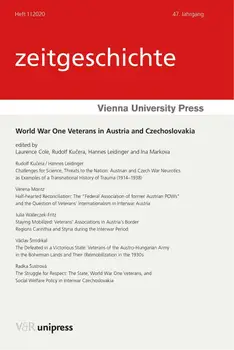The First World War massively changed the scale and nature of the "military veteran question" in Europe. The enormous impact of mass deaths and destruction, the demise of old empires, and the rise of new nation states resulting from total war made the fate of ex-soldiers into a key issue that shaped all societies in interwar Europe. The unprecedented number of combatants, together with the severity and frequency of injuries incurred in industrialized warfare, meant that the relationship between ex-soldiers and the state became a crucial issue for all governments, raising major questions about welfare provisions, social policy, party politics and national memory cultures. While there has been much recent research on war veterans in Germany and other European countries, other regions of Central and East-Central Europe have attracted noticeably less attention. For this reason, this special issue presents research on the comparative history of World War One veterans in Austria and Czechoslovakia. This transnational investigation breaks new ground by investigating two neighbouring states that showed distinct patterns of immediate post-war reconstruction, as well as of subsequent development.
World War One Veterans in Austria and Czechoslovakia
Commencez votre essai gratuit de 14 jours
- Accès complet à des centaines de milliers de livres audio, d’e-books et de magazines dans notre bibliothèque
- Créez jusqu'à 4 profils — y compris des profils enfants
- Lisez et écoutez hors ligne
- Abonnements à partir de 9,99 € par mois

World War One Veterans in Austria and Czechoslovakia
The First World War massively changed the scale and nature of the "military veteran question" in Europe. The enormous impact of mass deaths and destruction, the demise of old empires, and the rise of new nation states resulting from total war made the fate of ex-soldiers into a key issue that shaped all societies in interwar Europe. The unprecedented number of combatants, together with the severity and frequency of injuries incurred in industrialized warfare, meant that the relationship between ex-soldiers and the state became a crucial issue for all governments, raising major questions about welfare provisions, social policy, party politics and national memory cultures. While there has been much recent research on war veterans in Germany and other European countries, other regions of Central and East-Central Europe have attracted noticeably less attention. For this reason, this special issue presents research on the comparative history of World War One veterans in Austria and Czechoslovakia. This transnational investigation breaks new ground by investigating two neighbouring states that showed distinct patterns of immediate post-war reconstruction, as well as of subsequent development.
Catégories associées

Treasured memories: Tales of buried belongings in wartime Estonia
Mats Burström
book
Por los caminos de san Pablo : Turquía, Grecia y Chipre
José Antonio Marín Jiménez
book
Black Pill : How I Witnessed the Darkest Corners of the Internet Come to Life, Poison Society, and Capture American Politics
Elle Reeve
audiobookbook
Voices of The New Belarus : Documentary Play. Writer's adition.
Andrei Kureichik
audiobook
Figures of Modernity : International Society for Contemporary Music and the Modern Music Movement in Lithuania
Rūta Stanevičiūtė
book
The British Dream : Successes and Failures of Post-war Immigration
David Goodhart
book
La fuerza de la esperanza : Camino de plenitud
Lázaro Albar Marín
book
Historia de la muy noble villa de Andorra -Siglos XII y XIII-
José Antonio Gracia Ginés
book
Une course aux capitales : Allemagne, Autriche, Roumanie, Russie, Suède, Norvège, Danemark
Pierre-Julien Hamard, Ligaran
book
Monster : A Tough Love Letter On Taming the Machines that Rule our Jobs, Lives, and Future
Paul Roehrig, Ben Pring
audiobook
Stages
Albert Poland
audiobook
Bleeding Armenia
Rev. A.W. Williams
book